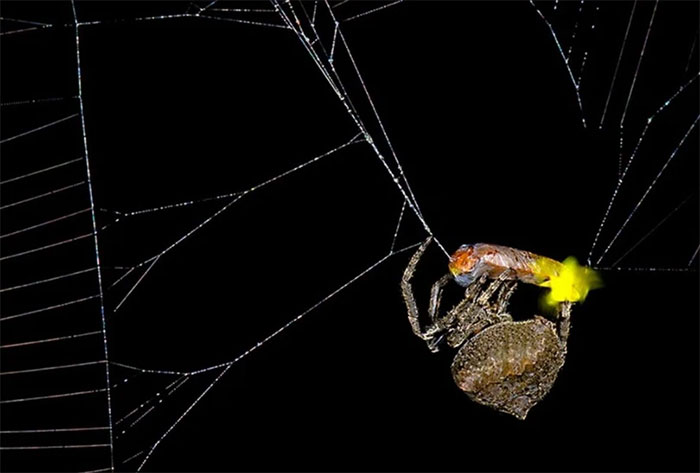Spiders can lure male fireflies into their nets with their 'love calls'
Research shows that spiders can manipulate the light rays of male fireflies caught in their webs to mimic the 'mating calls of females'.
Spiders have evolved an impressive array of hunting techniques – from trapping prey with saliva to creating 'webs' strong enough to trap snakes. Researchers have discovered a particularly vicious tactic that some 'web-weaving' spiders can use to lure fireflies into their webs.
A study published in the journal Current Biology found that some spiders appear to manipulate the flashing signals of male fireflies caught in their webs to mimic the signals of females.
This sparkling 'love call' attracts other male fireflies to the spider's web, just as a mermaid's song attracts sailors to their deaths.

Researchers believe spiders may be able to manipulate the bioluminescent signals that fireflies use to find mates. (Source: National Geographic)
The idea of spiders delaying meals and using prey as bait is intriguing in itself, says Dinesh Rao, a researcher at the University of Veracruzana.
"Spider's always hungry, right? - So to say 'Okay, I'm not going to eat this firefly right now and I'll wait for the next one', that's interesting."
But while Rao and other experts agree that something is changing the flashing patterns of male fireflies kept in captivity, they say more research is needed to determine whether spiders are actually 'behind the action' and how they do it.
'Deadly Love Call'
While observing spider webs in the field in 2004 as part of her PhD research, Xinhua Fu, a firefly researcher from China's Central China Agricultural University and lead author of the study, noticed something strange: Only male fireflies were caught in the spider's 'deadly ' trap. Even stranger, some of the trapped males emitted flashing signals similar to those of the females.
Do spiders have anything to do with this phenomenon?
To investigate, Fu and his team traveled to a village near Wuhan, China, in an agricultural area dotted with rice paddies and ponds. There, they chose to study Araneus ventricosus, a common 'web-weaving' spider : It spins a new web every night, when fireflies are also active.
The team used nets to catch male fireflies and placed them on spider webs using small tweezers. They then set up cameras to observe what happened on the webs under different conditions.
"When a male firefly gets caught in the web, the spider first wraps itself around the firefly and bites its chest, injecting a small amount of venom," Fu explained. The spider then leaves the male firefly in the middle of the web and hides itself at the edge of the web.
Soon, the trapped firefly begins to produce female-like flashing signals — consisting of single flashing pulses — that attract other male fireflies looking for mates to the web.
When the firefly stops flashing, the spider repeats the process. Fu said the whole process usually lasts about two hours, after which the spider begins to eat its prey.
Fu said the team was surprised by this behavior because web spiders are known to have poor eyesight. Despite this, it appears they "can still detect flash patterns of different intensities."
More evidence needed
But what actually causes the firefly's flashing signal to change?
Fu and his team hypothesize that the spiders manipulate the firefly's flashing signals in some way —perhaps through their venom, they speculate. But more evidence is needed to support this hypothesis.

Spiders are known to use mimicry and deception to catch their prey. (Source: National Geographic)
'Overall, the paper is very interesting,' Rao said. 'The only thing I'm not entirely convinced about is whether the spiders actually do anything to change the way the male fireflies flash.' He noted that a neurological study would be needed to understand exactly what causes this change.
Kathryn M. Nagel, a PhD candidate specializing in spider behavior at the University of California, Berkeley, agrees with Rao. She says that 'further research is needed to determine whether spiders directly 'manipulate' firefly signaling behavior.
Fu said the next step is for him and his team to study 'how web spider venom affects fireflies' ability to control their light output.'
Spiders are known to use mimicry and deception to catch prey. For example, some spiders that hunt other spiders use 'web signals to mimic captured prey, luring the 'target' spider to come closer, ' Nagel said.
'Arthropods are often thought of as 'simple' creatures lacking sophisticated behaviour, but this is not true,' says Nagel .
'This study and others like it highlight how previously 'overlooked' creatures are capable of complex behaviour, and how much we still have to learn about spider behaviour,' she said.
- The unique gift of fireflies
- Torn apart because of love
- Fireflies glow to do?
- Incredibly spider species die because of ...
- How to identify harmful spiders on plant leaves?
- This is the color that people fear spiders should avoid wearing
- Spotted spiders emitting a
- Why so little bigger spiders male spiders?
- Biodegradable fishing nets
- The spider family has the most
- Learn the glowing mechanism of fireflies
- Explain the ability to glow in the night of fireflies
 Animal 'suffering' after hibernation
Animal 'suffering' after hibernation Why do goats climb well?
Why do goats climb well? Scientists were surprised to see chimpanzees eating turtles
Scientists were surprised to see chimpanzees eating turtles Giant catfish died deadly due to drought in Thailand
Giant catfish died deadly due to drought in Thailand